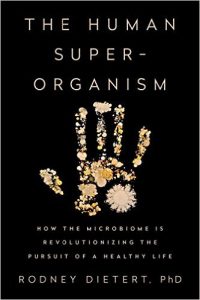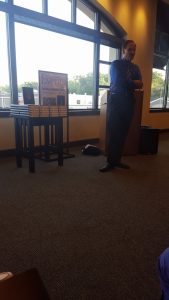My review copy of this interesting book was graciously provided by the publisher.
“What if the very basis of what a human is was radically different from what we were taught as children?”
Thus opens The Human Superorganism, Dr. Rodney Dietert’s exegesis on rethinking human biology and human health.  It’s a provocative idea that leads handily into a very thought-provoking set of ideas about what constitutes “healthy” living and how this new concept reflects a paradigm shift in not only our approach to health but also our approach to the human body. I had the distinct pleasure of meeting the author and listening to him speak about his theories, his research, and his book. It was a very interesting addition to the information I gleaned from the book, and really fleshed out many of the topics for me. Dr. Dietert is a delightful man and a very easy-going speaker, and his enthusiasm for the topic was obvious and endearing.
It’s a provocative idea that leads handily into a very thought-provoking set of ideas about what constitutes “healthy” living and how this new concept reflects a paradigm shift in not only our approach to health but also our approach to the human body. I had the distinct pleasure of meeting the author and listening to him speak about his theories, his research, and his book. It was a very interesting addition to the information I gleaned from the book, and really fleshed out many of the topics for me. Dr. Dietert is a delightful man and a very easy-going speaker, and his enthusiasm for the topic was obvious and endearing.
The proposition laid out in the book is deceptively simple: the human body is host not only to what we traditionally think of as ourselves and our cellular composition, but also to a veritable ecological system of microbes (bacteria, viruses, fungi, and parasites), a “microbiome”, that is found inside of us. As a result, human beings should be considered “superorganisms”, akin to rainforests or coral reefs. The novelty of this proposition is not so much in its factual existence, but in the state of that ecological system, since it turns out that human beings are just as hard on their own ecosystem as they are on others… In a nutshell, as a result of much modern medical technology and behaviour, the theory goes, we are decimating our microbiome to the detriment of our health just as severely as we are decimating rainforests and reefs.
Provocative, no?
The book is organized into three parts. The first lays out the theory, the second describes where things began to go wonky (largely, through unanticipated consequences stemming from our attempts to control and/or thwart contagious diseases), and the third attempts to resolve that wonkiness with a series of recommendations on how to regain equilibrium between the mammalian and microbial parts of our bodies. The theory is well-thought out and well-presented. Dr. Dietert’s writing style is conversational without being overly simplistic. He manages a handy turn of phrase, and the book reads much the way the man himself speaks: with clarity, passion, and a taste for rhetoric that renders even the denser portions of the science and theory into accessible language. He populates both his book and his speeches with fun facts and interesting tidbits, rendering the science even more intriguing than it is on its own. Example: notice the cover art? That’s a quite famous photograph taken by microbiologist Tasha Sturm – of her eight year old son’s hand, after playing outside. It’s amazing enough to learn that; even more fun to learn was why this particular  photo was chosen by Dr. Dietert for his book cover. It wasn’t just the gorgeous imagery of the microbial diversity found on the human body. It was also a fun, sly reference to one of the glyphs in the opening imagery for the television show Fringe – a creepily fascinating J.J. Abrams sci-fi series (2008-2013) about the world-within-the-world of “fringe” science. How can you not be instantly captivated by someone who artfully melds pop culture with high science? I certainly was…
photo was chosen by Dr. Dietert for his book cover. It wasn’t just the gorgeous imagery of the microbial diversity found on the human body. It was also a fun, sly reference to one of the glyphs in the opening imagery for the television show Fringe – a creepily fascinating J.J. Abrams sci-fi series (2008-2013) about the world-within-the-world of “fringe” science. How can you not be instantly captivated by someone who artfully melds pop culture with high science? I certainly was…
Dr. Dietert has been traveling about the country, speaking to and with audiences of government regulators, scientists, and regular citizens like you and me. It is easy to see how these have become sold out shows. The theory is clearly and carefully presented, his proposal self-described as expansive rather than threatening to the status quo. “We’re not meant to be a purified species, we’re meant to be whole.” Dr. Dietert is trying to encourage a paradigm shift in our approach to human health. The “miracle of antibiotics saved us…and also led us to…fear of anything that was microbial.” This fear is having adverse effects that were unanticipated and is contributing to the decimation of many of the bacteria and other microbes in our bodies. This, he postulates, combined with other contemporary factors (including increases in Caesarean births, urbanization, changes in food/diet, and misdirections regarding human safety), is behind the dramatic increase in noncommunicable diseases (think things like diabetes, asthma – those often designated as “chronic”). Essentially, he is arguing that we need to supplement our naturally-present microbes to allow the microbial ecosystem to replenish itself and make itself more hospitable. This will allow us to regain the equilibrium our bodies have lost and hopefully result in a healthier – and even happier – population.
There is a lot of food for thought here. Fortunately, it is presented in a readily palatable format. While I’m not sure that the proposals for change contained therein are going to be to everyone’s taste, the theory behind it all remains very interesting and thought-provoking, and is definitely worth a look. And if you need a teaser, check out a video of Dr. Dietert’s lecture, courtesy of the WGBH Forum Network. It will give you a great sense of the author and his book.


 Jill-Elizabeth LinkedIn
Jill-Elizabeth LinkedIn



Leave a Reply